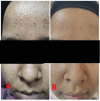Evaluation of the Effect of Oral Isotretinoin on the Level of Serum YKL40 in Acne Vulgaris Patients: A Cross-Sectional Case-Control
- PMID: 37965101
- PMCID: PMC10642491
- DOI: 10.2147/CCID.S431856
Evaluation of the Effect of Oral Isotretinoin on the Level of Serum YKL40 in Acne Vulgaris Patients: A Cross-Sectional Case-Control
Abstract
Background: In the entire world, acne vulgaris (AV) is the most prevalent skin condition. Approximately 9.4% of people worldwide have acne vulgaris. This study compared the blood levels of chitinase 3-like protein 1 (YKL-40) in acne vulgaris patients before and after oral isotretinoin therapy.
Patients and methods: The design of the study was cross-sectional case-control. Forty patients with moderate to severe acne vulgaris and twenty healthy participants participated in this study. Using the Global Acne Grading System (GAGS) score, patients with acne vulgaris were evaluated both before and after concluding their treatment. Using the enzyme-linked immunosorbent assay (ELISA), the serum levels of YKL-40 were measured before and after oral isotretinoin therapy in healthy controls and acne patients.
Results: Patients with acne vulgaris had considerably greater serum levels of YKL-40 than healthy control subjects (p 0.001) did. After three months of oral isotretinoin medication, the GAGS score and blood levels of YKL-40 in acne vulgaris patients both significantly decreased.
Conclusion: The conclusion of this study was that reducing the blood levels of YKL-40 and the GAGS score in patients with acne vulgaris who took oral isotretinoin for three months was a crucial strategy.
Keywords: GAGS; YKL-40; acne vulgaris; isotretinoin.
© 2023 Ali et al.
Conflict of interest statement
The authors reported no potential conflicts of interest.
Figures
References
-
- Sharara M, Diab H, Reda AER. A pilot study on serum lactoferrin in patients with mild versus severe acne in correlation with disease duration. J Egypt Women Dermatol Soc. 2019;16(3):193–197. doi:10.4103/JEWD.JEWD_35_19 - DOI
-
- Khaled HN, Hamid WGA, Alghobashy Y. Chitinase-3 protein-like-1 as inflammatory marker and disturbed lipid-profile risk in acne vulgaris. Menoufia Med J. 2022;35(2):477. doi:10.4103/mmj.mmj_271_21 - DOI
-
- Patnaik S, Purohit D, Biswasroy P, Diab WM, Dubey A. Recent advances for commedonal acne treatment by employing lipid nanocarriers topically. Int J Health Sci. 2022;6:180–205. doi:10.53730/ijhs.v6nS8.9671 - DOI
LinkOut - more resources
Full Text Sources
Research Materials




